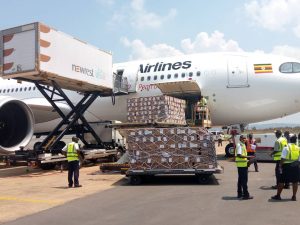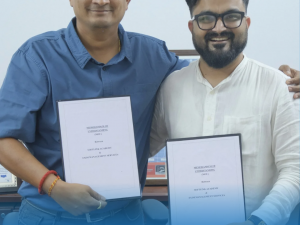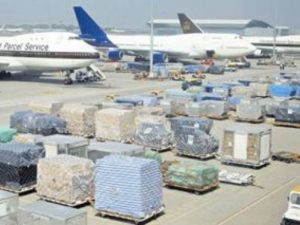Uzbekistan-based cargo airline My Freighter has officially started scheduled cargo operations with the launch of a new route from Shanghai Pudong (PVG) to Amsterdam Schiphol (AMS) via its main hub in Tashkent (TAS), said Linkedin Post. Flights will take place two times a week using a Boeing 767-300 freighter, with a total transit time of 17 hours. My Freighter said its entry into scheduled cargo operations has been made possible through its partnership with cargo sales agent, Air Cargo APAC. The airline said the new route addresses growing airfreight demand between China and Europe and will also help develop Tashkent into an international logistics hub. My Freigher stated the route is ‘designed as a smart logistics solution, linking China’s largest manufacturing and export hub with one of Europe’s key cargo gateways via strategically located Tashkent.’
Read More »‘Seamless inter-state coordination & unified compliance must’
Huned Gandhi, Managing Director Air & Sea Logistics Indian Subcontinent, Dachser India said, “While major reforms have been introduced in recent years, a few areas still require focused attention like seamless inter-state coordination and unified compliance frameworks, expansion of sector-specific infrastructure, including cold chains and hazardous goods handling, digitally integrated systems for customs, warehousing and transportation across the private and public sectors, continued focus on skill development to address workforce shortages in specialised logistics functions and development of urban freight solutions and smart last-mile delivery networks. Dachser India contributes to this vision through its digital infrastructure, such as the DACHSER Platform, which offers customers a unified interface to manage, track and control shipments across modes. Internally, ongoing training and upskilling programmes ensure that teams are equipped to deliver consistent and compliant services in a complex logistics environment. These combined efforts align with the broader goals of building a modern, efficient and globally competitive logistics ecosystem in India.”
Read More »Softlink Academy signs MoU to bridge skills gap in EXIM & logistics
Softlink Academy has signed MoU with EXIM Management Services and SNDT Women’s College, Pune to bridge the skills gap in India’s Export-Import (EXIM) and logistics sector. The MoU enables a commercial collaboration that trains and empowers students — especially women — in EXIM logistics through certified programs, digital tools and real-world exposure. By combining academic learning with real-world application, the program will produce a skilled, confident and future-ready workforce capable of meeting the demands of global trade. Historically, women have been underrepresented in EXIM and logistics due to limited access to specialised training and persistent gender biases. Partnering with SNDT Women’s College marks a purposeful step towards creating a more inclusive and diverse industry. Amit Maheshwari, Founder & CEO, Softlink Global said, “Knowledge is the foundation of progress, but when combined with practical experience and digital tools, it becomes a powerful force for transformation. Through Softlink Academy, we’re committed to nurturing talent that can shape the future of EXIM — not just by understanding the trade, but by leading it.”
Read More »Global air cargo volumes see 5% jump in July: Xeneta
Global air cargo volumes jumped over 5 per cent year-on-year in July as more shippers opted for the speed of airfreight to help circumvent U.S. tariffs, according to the latest market analysis by Xeneta. Market sentiment, however, remains subdued as tariff talks in Washington remain in flux, with a new deadline now set for 7 August for a broad range of trading partners. The lack of clarity continues to cast a shadow over global trade flows, particularly in the airfreight sector. Contrary to the usual seasonal lull, July saw a notable upturn in global air cargo demand following a modest over one per cent gain in June. This unexpected boost, bucking seasonal patterns, appears driven in part by tariff-related frontloading, mode shift and persistent uncertainty, prompting businesses to expedite shipments. With cargo capacity in July increasing by a lower level of over 3 per cent year-on-year, the more robust over 5 per cent rise in volume helped lift the dynamic load factor, which has now returned to levels comparable with a year earlier (58 per cent) and recovering the minus 2 per cent point decline recorded just a month ago. Dynamic load factor is Xeneta’s measurement of capacity utilisation based on volume and weight of cargo flown alongside available capacity.
Read More »Chennai Airport sees 19% rise international air freight handling
Chennai airport has reportedly seen a 19 per cent growth in international freight handling in the quarter ended June 2025. As per the reports, it is the highest growth among all the major airports. This fiscal, Chennai has overtaken BIAL airport largely due to increase in export volume of Apple phones and import of electronic components. Earlier, BIAL was ahead of Chennai. The Chennai airport in the first quarter handled 82,844 tonnes of international freight as against 69,629 tonnes in the corresponding quarter last year. In comparison, Bengaluru handled 80,075 tonnes in June 2025 quarter compared to 79,014 tonnes in the year-ago period, according to Airports Authority of India data.
Read More »Wisor.AI selects CargoCONNECT to boost air freight bookings
CargoAi and Wisor.AI have partnered to integrate its Quote & Book API from the CargoCONNECT suite. This strategic integration enables Wisor users to instantly access live airline pricing and booking capabilities directly from within Wisor’s intelligent freight management platform. By embedding CargoAi’s Quote & Book API, Wisor.AI enhances its AI-driven transport planning capabilities, empowering freight forwarders to streamline procurement and accelerate air cargo operations. Key benefits include real-time access to over 105 airlines, over 680 schedules, and 2.5M dynamic rates, instant booking capabilities, eliminating manual quote requests and FlyWindow support for bookings with non-API connected airlines. This integration gives Wisor users fast, centralised access to airfreight booking, enabling smarter decisions and better service delivery across the supply chain.
Read More »‘It will reduce delays, speed up transfers for Int’l transshipment
Vipin Vohra, Chairman, Continental Carriers said, “BCAS’s relaxation of re-screening norms for transit cargo will significantly cut costs, reduce delays and speed up transfers, especially for international transshipments. By aligning with global standards, it enhances India’s appeal as a transshipment hub, boosts competitiveness, supports express and e-commerce logistics and enables Indian carriers to scale up operations, driving higher cargo volumes through Indian airports.”
Read More »‘Easing cargo re-screening at transfer airports can boost efficiency’
Vandana Singh, Chairwoman Aviation and Cargo, FAII said, “Easing cargo re-screening at transfer airports is a pragmatic step towards improving transit efficiency. While it will help reduce delays and optimise resources, its success will depend on robust implementation and adherence to security protocols. A balanced approach can strengthen India’s air cargo competitiveness while maintaining the highest safety standards”
Read More »‘The decision will reduce dwell time & handling cost’
Balagopal Balachandran, National Head Air Freight, FEI Cargo said, “The directive, issued as Addendum–II to AVSEC Circular No. 6/2024, introduces a unified framework for handling transfer shipments, across international to international, international to domestic, domestic to international and domestic to domestic routes. The transit cargo will be secured using Transfer Cargo Security Hold Areas (TCSHAs), which are secured zones within an airport’s restricted area approved by the Director General of BCAS. This reform reduces dwell time, lowers handling costs, minimises shipment delays and prevent unauthorised interference. Airlines will enjoy a faster aircraft turnaround, forwarders/GHA gain seamless hub connectivity and shippers get greater speed to market. The changes are expected to boost India’s transshipment volumes by approx 8–10 per cent annually. In Global logistics, minutes mean millions and India is now racing ahead to claim a bigger slice of Regional cargo flows.”
Read More »‘Faster processing will boost express logistics, e-commerce growth’
Kamal Jain, Director, Cargomen Logistics said, “Relaxed cargo re-screening rules in India are set to transform the air cargo industry by eliminating redundant X-ray checks at transfer airports. Under new BCAS guidelines, secure shipments sealed and held in Transfer Cargo Security Hold Areas can bypass re-examination, cutting ground delays and handling times. This streamlining reduces operational costs, boosts cargo throughput and enhances reliability, positioning India as a competitive air freight hub alongside Dubai and Singapore. Faster processing will accelerate express logistics, fuel e-commerce growth and help Indian airlines capture more high-value transshipment cargo, all while maintaining strict security through advanced surveillance, secure zones and real-time tracking. This balance of efficiency and safety marks a major leap forward for India’s cargo ecosystem. Though there are risk in bypassing the double check but it will be mitigated through rigorous checking at origin.”
Read More » Cargo Breaking News
Cargo Breaking News









